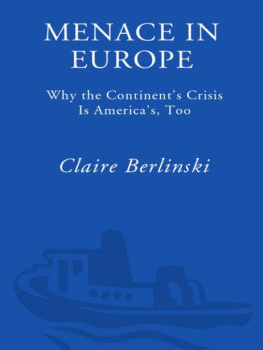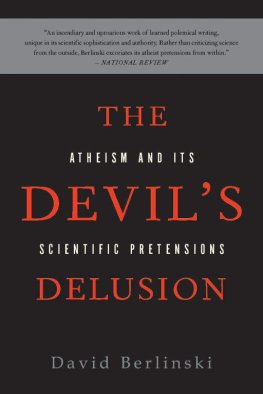Claire Berlinski - Menace in Europe: Why the Continents Crisis Is Americas, Too
Here you can read online Claire Berlinski - Menace in Europe: Why the Continents Crisis Is Americas, Too full text of the book (entire story) in english for free. Download pdf and epub, get meaning, cover and reviews about this ebook. year: 2006, publisher: Crown Forum, genre: Art. Description of the work, (preface) as well as reviews are available. Best literature library LitArk.com created for fans of good reading and offers a wide selection of genres:
Romance novel
Science fiction
Adventure
Detective
Science
History
Home and family
Prose
Art
Politics
Computer
Non-fiction
Religion
Business
Children
Humor
Choose a favorite category and find really read worthwhile books. Enjoy immersion in the world of imagination, feel the emotions of the characters or learn something new for yourself, make an fascinating discovery.
- Book:Menace in Europe: Why the Continents Crisis Is Americas, Too
- Author:
- Publisher:Crown Forum
- Genre:
- Year:2006
- Rating:3 / 5
- Favourites:Add to favourites
- Your mark:
- 60
- 1
- 2
- 3
- 4
- 5
Menace in Europe: Why the Continents Crisis Is Americas, Too: summary, description and annotation
We offer to read an annotation, description, summary or preface (depends on what the author of the book "Menace in Europe: Why the Continents Crisis Is Americas, Too" wrote himself). If you haven't found the necessary information about the book — write in the comments, we will try to find it.
Menace in Europe: Why the Continents Crisis Is Americas, Too — read online for free the complete book (whole text) full work
Below is the text of the book, divided by pages. System saving the place of the last page read, allows you to conveniently read the book "Menace in Europe: Why the Continents Crisis Is Americas, Too" online for free, without having to search again every time where you left off. Put a bookmark, and you can go to the page where you finished reading at any time.
Font size:
Interval:
Bookmark:

Table of Contents
For my grandmother... who has seen it all
I know that Europes wonderful, yet something seems to lack;
The Past is too much with her, and the people looking back.
Henry Van Dyke
CHAPTER 1
EUROPE ON FIVE DOLLARS A DAY AND A FLAMETHROWER
I KEEP A SPIRAL-BOUND notebook on my desk filled with miscellaneous notesthe usual collection of ideas that seem insightful at three in the morning but substantially less so at daybreak, ideas that may well have been insightful but have been lost to posterity because my handwriting is indecipherable, scraps of overheard dialogue, observations made from the windows of trains.
One scrawled passage in particular stands out now. The date was July 3, 2005. Within six months, I wrote, there will be another major terrorist attack or political assassination in Europe. I am embarrassed to admit that my next thought, apparently, was that this would be inconvenient for me, since it would necessitate making major revisions to this book.
Three days later, Trafalgar Square erupted in celebration at the announcement that London would host the 2012 Olympics. The next morning, as the rush hour drew to a close, four suicide bombers detonated themselves in central London, killing 52 people and injuring 700 more. Papers with headlines from the previous evening had not yet been pushed off the newsstands: Blimey! Its Londons turn! said one, and I can only imagine how those jolly words must have appeared to commuters staggering off the smoke-blackened London Tube.
Four more bombings were attempted on the London transport system two weeks later. This time, the bombs failed to detonate and the bombers survived, leaving behind forensic evidence that permitted police to ascertain their identities. Both the living and the dead bombers were British, born and raisedhomegrown monsters who had not yet been apprised of the news that democracies dont breed terrorists. Some were from comfortably affluent families. Some had been living handsomely for years on state benefits. It now appears that al Qaeda, which took credit for the attacks, recruited some of the bombers at a Muslim community center in Leedsone funded by the British government and the European Union.1
It was revealed in the weeks following the attacks that quite a number of British Muslims do not much care for their fellow Britons. According to a poll conducted shortly after the bombing, a full 32 percent of British Muslims agreed that Western society is decadent and immoral and Muslims should seek to bring it to an end. Toward that goal, 1 percenta seemingly small proportion until one considers that this comprises some 16,000 British Muslimsdescribed themselves as willing, even eager, to embrace violence to destroy that society. According to the same poll, 6 percent of British Muslims saw the bombings as justified, 56 percent understood why some people behave in that way, and 16 percent felt not loyal towards Britain.2 This is not, of course, a problem limited to Britain: every European country is now home to large populations of alienated, unassimilated Muslims who despise the West.
As the portrait of the bombers became clearer, sharply illustrating these fissures in Europes social fabric, a large cohort of the professional commentariat proclaimed themselves shocked. I believe I heard the same people, several months later, proclaiming themselves shocked by the news that Kate Moss uses cocaine. Those of us who had been paying attention were not shocked at all.
This protest, for example, outside the U.S. embassy in London on May 20, 2005, was the kind of clue some of us had been noticing:
Shouting, Down, down USA; down, down USA, the protesters called for the killing of Americans, the death of the U.S. president, the death of British Prime Minister Tony Blair, the bombing of Britain, and the annihilation of the U.S. capital: Nuke, nuke Washington; Nuke, nuke Washington! Bomb, bomb the Pentagon.... Death, death Tony Blair; death, death Tony Blair. Death, death George Bush, the protesters chanted.... Holding their Qurans high, they called for death and mayhem, praising the destruction of New Yorks twin towers on September 11, 2001, and saying the White House is next.3
I did not think these demonstrators were just joking then, and I certainly do not now.
The trend has been in evidence for years. British-based terrorists were involved in the planning and execution of the suicide bombing of American embassies in Kenya and Tanzania in 1998. They were involved in the planned attack on the American embassy in Albania. They were associated with the attempted attack on Los Angeles International Airport in 2000 and, most important, with the September 11 attacks on New York and Washington.
One week after the London bombings, it was reported that Mohammed Sidique Khan, believed to have been the operations field commander, had been in contact with a suspected recruiter for an extremist group in New York. Two other men linked to the plot had direct ties to the United States: one had traveled recently to Ohio; another had been a student at an American university.4
I have those same handwritten notes beside me now. On the evening of July 7, 2005, having spent the day following the news on the Internet and exchanging e-mails with my friends in London, I wrote these words: The same thing will happen soon in the United States, and the bombers will come from Europe. They will come from Europe because it is comparatively easy to enter the United States if you carry a European passport, and because Europe isas it always has beenthe breeding ground of the worlds most dangerous ideologues.
Although I take as much satisfaction as the next woman in being right, Id much prefer to be wrong about this. Unfortunately, I dont think I am.
To judge from the number of books published in recent years about the challenges of renovating a farmhouse in Tuscany or Provence, large swaths of Europe are now populated by middle-aged American divorces, living large on alimony and greatly occupied by the tending of their new olive terraces. As far as they are concerned, the chief problem with life in Europe is the difficulty of coaxing the medieval plumbing in their newly acquired Renaissance villas into action. (These women are survivors. They grow from this tough experience.)
Many Americans know this version of EuropeAlimony Europe, Fodors Europe, Europe on Five Dollars a Day quite well. They know it from books and movies, they know it from their summer vacations. They remember backpacking through Europe after graduating from college. Amsterdam was great, until Flounder fell in the canal. They think wistfully of that ad in the back of the New York Review of Books: Dordogne18th-century stone manor. Antiques, all original beams, 18 cathedral ceiling, fireplace, pool. 28 bucolic acres of woods, meadow, fruit and walnut trees, stream. Must be willing to feed goats. When they visit Europe, they travel from one historic and lovely city center to another, making use of Europes convenient railroads. They do not visit the places most Europeans actually live, and know little about them.
Indeed, most Americans born after the Second World War have grown up thinking of Europe, Western Europe in particular, as not much more than a congeries of windmills, gondolas, dissipated monarchs, and peculiar toilets. They have considered the political and moral essence of Europe, when they have considered it at all, to be much like our own. They have, of course, heard the stories about the cancerous, deranged thing of the past, but that Europe, they believe, is long dead, vanquished by the United States in the First and Second World Wars, resurrected in our image through the Marshall Plan. Europe? Its free, prosperous, peaceful, and democratic now, right? We dont need to worry about it anymore.
Font size:
Interval:
Bookmark:
Similar books «Menace in Europe: Why the Continents Crisis Is Americas, Too»
Look at similar books to Menace in Europe: Why the Continents Crisis Is Americas, Too. We have selected literature similar in name and meaning in the hope of providing readers with more options to find new, interesting, not yet read works.
Discussion, reviews of the book Menace in Europe: Why the Continents Crisis Is Americas, Too and just readers' own opinions. Leave your comments, write what you think about the work, its meaning or the main characters. Specify what exactly you liked and what you didn't like, and why you think so.






